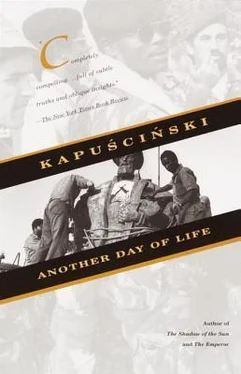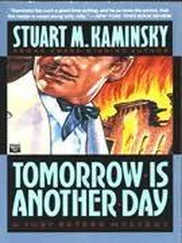A truck drove around the city that day and removed the statues of the Portuguese conquerors from their pediments. The governors and the generals, the travelers and the explorers were collected in front of the citadel and arranged in two brown granite rows. The plazas and squares looked even emptier. That afternoon an airplane flew in carrying foreign delegations. Only a few came. Rumors were circulating around the world that a squadron from Zaïre would bomb the airport that day and there would be no return. The cautious majority waited in their own countries for the unfolding of events in our city. It seems that they were right, because — as emerged later — the decision to destroy the airport had been reversed only at the last minute.
Thousands of people gathered at night in one of the squares. There had been requests to avoid large crowds so as to prevent a massacre in case of attack. The night was dark and cloudy, and the scene at the assembly recalled the secret meetings of the Kimbangists.
The cathedral clock struck twelve.
November 11, 1975.
Quiet reigned on the square. From the speakers’ platform, Agostinho Neto read a text proclaiming the People’s Republic of Angola. His voice broke and he had to pause several times. When he finished, there was applause from the invisible crowd, and the people cheered. There were no more speeches. After a moment the lights on the platform went out and everyone departed rather hastily, lost in the darkness. On the northern front the artillery was silent. But suddenly the soldiers in town began shooting wildly into the air in celebration. There was a chaotic uproar and the night came alive.
In the Tivoli, Oscar went to the safe and took out a bottle of champagne and a bottle of whisky that he had saved for the occasion. We were the oldest residents of the hotel, a crowd of veterans. Instead of evoking cheer and joy, the alcohol intensified our tiredness, our exhaustion. Oscar, who had long been at the limits of his strength, now drunk, called out in despair, “If this is what independence is like, I’ll blow my brains out!” After a moment it dawned on him that this was out of place, so he laughed and then grew quiet; in the end, he fell asleep with his head on the table amid the empty glasses.
There was a reception for the foreign delegations at Government Palace in the morning. I sent a dispatch to Warsaw that day:
LUANDA PAP 11.11. THE INDEPENDENCE CELEBRATIONS TAKING PLACE IN LUANDA HAVE BEEN PEACEFUL SO FAR. THE HOLIDAY ATMOSPHERE HAS BEEN SPOILED BY FNLA GUNNERS WHO HAVE AGAIN SHELLED THE PUMPING STATION AT QUIN-PANDONGO AND LEFT LUANDA WITHOUT WATER FOR TWO DAYS. IN THIS CONNECTION, A WILD STRUGGLE TOOK PLACE TODAY FOR INVITATIONS TO THE RECEPTION THAT PRESIDENT NETO GAVE AT GOVERNMENT PALACE BECAUSE OF RUMORS THAT IT WOULD BE POSSIBLE TO DRINK WATER THERE.
A RADIO STATION — NON-ANGOLAN — HAS REPORTED THAT THE FNLA AND UNITA HAVE DECIDED TO FORM THEIR OWN GOVERNMENT WITH A CAPITAL IN HUAMBO. THIS WILL BE ONLY A PRO FORMA CAPITAL SINCE THE ACTUAL HEADQUARTERS OF THESE ORGANIZATIONS IS KINSHASA. THUS ANGOLA HAS BEEN DIVIDED FOR THE MOMENT INTO TWO STATES WITH INCREDIBLY COMPLICATED BORDERS THAT CHANGE ALMOST EVERY DAY ACCORDING TO WHICH SIDE LAUNCHES AN OFFENSIVE TODAY OR TOMORROW AND WHAT PART OF THE TERRITORY IS TAKEN FROM THE ENEMY. NOW MUCH WILL DEPEND ON WHICH COUNTRIES RECOGNIZE THE MPLA GOVERNMENT OR THE FNLA-UNITA GOVERNMENT, AND AT WHAT TEMPO. SO A NEW, DIPLOMATIC WAR FOR ANGOLA HAS BEGUN.
IN THE MEANTIME, THE REAL WAR IS INTENSIFYING. BOTH SIDES ARE GETTING STRONGER. THERE ARE MORE AND MORE MEN, BETTER-TRAINED TROOPS, AND WEAPONS OF GREATER DESTRUCTIVE POWER.
ON MONDAY, NOVEMBER 10, THE ENEMY BEGAN A NEW TWO-FRONT OFFENSIVE. THERE WAS AN ATTEMPT TO CAPTURE LUANDA FROM THE NORTH. ARMORED VEHICLES AND ARTILLERY TOOK PART IN THE ASSAULT ALONG WITH COMPANIES OF ZAIRIAN TROOPS AND PORTUGUESE MERCENARIES. THE SOUTH AFRICAN ARMY, WHICH IS MOVING FROM THE SOUTH IN TWO MOBILE AND POWERFUL ARMORED COLUMNS, IS HEADING FOR PORTO AMBOIM AND, FURTHER ON, LUANDA. MPLA UNITS IN THIS AREA ARE ORGANIZING A DEFENSIVE LINE WITH THE MISSION OF HOLDING PORTO AMBOIM AT ALL COSTS FIN. COULD YOU SEND A LITTLE MONEY AND SOME CIGARETTES???? TKS IN ADVANCE BYE
Ruiz throttled back: The plane descended toward earth. We had passed Porto Amboim, a small fishing port, and flown over the wide, dark Cuvo River; then the plane flew straight for a few more minutes until it banked and we started back. Ruiz motioned for me to look through the windshield. Below, I could see a road that led to the river and seemed to have dropped into the water, because the bridge across the river had been destroyed. Now we flew along a road on which I could see a motionless column of armored vehicles. I counted: There were twenty-one of them and farther on stood trucks pulling artillery and, at the rear, five jeeps. People wandered along both sides of the road. We returned over the far bank of the river, passing zigzags of trenches below and some units on the road. The plane descended to treetop level and landed on the runway at Porto Amboim airport.
Ruiz had been carrying ammunition and flew straight back to Luanda, but I stayed behind. It was less than twelve miles along the riverbank to the front. A soldier with very dark skin took me there in a car. I asked him in Portuguese if he was from Luanda. No, he answered in Spanish, from Havana. It was hard to tell them apart by sight in those days, because the Cubans had clothed many MPLA units in uniforms they had brought over. This also had a psychological significance, because the FNLA and UNITA troops feared the Cubans most of all. They turned and ran at the sight of units in Cuban uniforms attacking, even though there might not have been a single Cuban among them. External differences were further effaced by the fact that both MPLA and Cuban units were multiracial, so skin color told nothing. Later, this all reinforced the legend of an army of a hundred thousand Cubans fighting in Angola. In truth, the whole army defending the republic came to not more than thirty thousand soldiers, of whom about two-thirds were Angolans.
We drove to a place where there were big cotton warehouses. Front headquarters was located here. You walked around in cotton up to your knees like snow. White moss grew on the uniforms and heads of the soldiers. You slept warm and comfortable here. The front line ran along the river. The South African units couldn’t break through because all the bridges had been blown. They hadn’t been prepared for that and were waiting for pontoon bridges. Both sides exchanged sporadic fire but felt too weak to attack. A ship was supposed to arrive the next day with two companies of Cubans and a company from Guinea-Bissau. Two MPLA units were on their way overland.
At dawn we drove along the front. It was pouring rain and piercingly cold. The car skidded in the mud and we had to flounder around on foot. We passed a dispersed unit, a dozen or more soldiers straggling along the road. Each of them was leading a small, barefoot, shivering child by the hand. At night, a few women with children had crossed to this side of the river in primitive African dugouts. The women had stayed at the shore to guard their belongings while the soldiers led the children to the rear, to the kitchen, to feed them.
I returned that same day in Ruiz’s airplane. Several badly wounded soldiers, local and Cuban, lay on the floor. There had been a night battle sixty miles east of Porto Amboim when the South Africans tried to force the river. The wounded made no noise; two of them were unconscious. Some African women sat motionless in the corner. The plane flew through clouds, lurching; rain fell below. We landed at Luanda in a downpour. Two heavy Antonovs stood on a side apron. They had brought mortars.
Читать дальше











